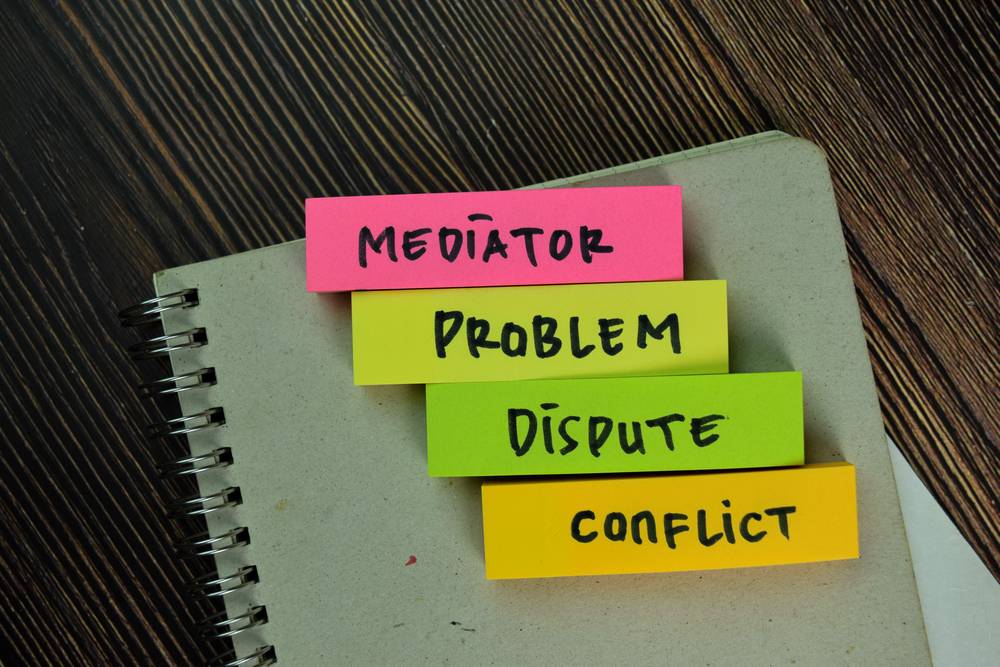
Family law disputes can be emotionally charged and financially draining for everyone involved. Whether a dispute revolves around children, property, or spousal maintenance, the traditional path of going to court can be costly in both time and money and can exacerbate conflicts rather than resolve them. This is why over the past few decades, mediation has become an increasingly popular and effective alternative to litigation.
In this blog, we will explore the benefits of mediation in family law disputes. We will examine how mediation works, who it benefits, and why it is often the preferred method for resolving disagreements over child custody, parenting arrangements, property division, and other family law issues.
Understanding Family Law Mediation
Mediation is a voluntary dispute resolution process that involves a neutral third party – known as a mediator – who helps parties negotiate and reach a mutually acceptable agreement. Unlike a judge, a mediator does not make decisions. Instead, the mediator facilitates discussion, encourages problem-solving, and supports the participants in identifying solutions that best address their needs and interests.
In the context of family law, mediation often revolves around issues such as:
- > Parenting arrangements (including living arrangements, visitation, and parental responsibilities)
- > Property settlement and financial matters
- > Spousal maintenance (ongoing financial support by one partner for another)
- > Child support arrangements
The Legal Framework
Mediation in family law disputes is encouraged and, in certain circumstances, required as part of the court pre-action procedures. One of the key developments in this area has been the integration of Family Dispute Resolution (FDR) as a step that parents must undertake before applying to a court for parenting orders, with limited exceptions.
Sections 60I and 10F of the Family Law Act highlight the significance of FDR and mediation. In most cases involving disputes over children, a court will require a certificate from a registered Family Dispute Resolution Practitioner (commonly called a “60I Certificate”) to prove that mediation or FDR has been attempted or to evidence why it was deemed unsuitable.
Family Relationship Centres and Private Mediation
Australia has a network of Family Relationship Centres, many of which offer mediation services that can be free or low-cost. These centres focus on helping separated or separating parents work out parenting arrangements.
Parties may also engage in private mediation, enlisting the services of an accredited family mediator, often a solicitor or barrister with specialist training in dispute resolution.
Need expert family lawyers in St Leonards or Manly? Matthew Buckley can guide you through your family law journey with expertise and compassion.
The Key Benefits of Mediation

Cost-Effectiveness
One of the most appealing benefits of mediation is its comparative affordability. Litigation can be prohibitively expensive due to court filing fees, legal representation costs, barrister’s fees, and the potential need for expert witnesses. Furthermore, the drawn-out nature of court proceedings can drive up those expenses, sometimes amounting to tens of thousands (or even hundreds of thousands) of dollars.
In contrast, mediation is generally faster and less formal, translating to fewer billable hours for solicitors and a more predictable fee structure. While the total cost of mediation varies depending on the complexity of the case, the number of sessions required and whether the parties use private or subsidised services is almost always considerably less expensive than going to court.
Time-Efficiency
Court cases in the Federal Circuit and Family Court of Australia take over a year to be finalised, depending on backlogs and the complexity of the dispute. Numerous hearings, adjournments, and the exchange of evidence can stretch out the time it takes to receive judgment,which causes stress and uncertainty for all involved.
Mediation, by contrast, offers an opportunity for the parties to resolve their dispute in a matter of weeks or months rather than years. After an initial intake or screening session, mediation sessions can be scheduled as promptly as the parties and the mediator are available. By concentrating on negotiation and compromise, mediation often accelerates the resolution of issues, allowing individuals to move forward with their lives sooner.
Less Adversarial Approach
Traditional litigation is an adversarial process, pitting one party against another in a courtroom setting. This competitive dynamic can escalate tensions, damage relationships, and cause significant emotional strain. When children are involved, the added conflict can take a toll on their well-being, as they may feel caught in the middle.
Mediation, conversely, is fundamentally collaborative. It promotes open communication, mutual understanding, and creative problem-solving. Rather than focusing on “winning” or “defeating” the other party, the emphasis shifts to reaching an outcome that both parties can live with. This environment encourages respectful dialogue and can reduce animosity, paving the way for better post-separation relationships.
Greater Control and Flexibility
In a court proceeding, the judge makes decisions based on submissions, evidence, and the relevant provisions of the Family Law Act. Parties relinquish their control over the outcome to the judicial officer, who must make judgment that they believe is just in the circumstances.
During mediation, each party has a significant role in shaping and agreement. The mediator does not impose orders. Instead, parties can customise arrangements for parenting and finances to reflect the unique dynamics of their family. This flexibility means that creative solutions can be explored, and outcomes can be tailored to the specific needs, values, and priorities of each family.
Preservation of Relationships
Particularly where children are concerned, maintaining a workable and civil relationship with one’s former partner can be crucial. Court battles often lead to deteriorated relationships due to the adversarial nature of litigation, making ongoing co-parenting very challenging.
As mediation is grounded in communication, cooperation, and respectful listening, it can help foster a better post-separation relationship. Parents are more likely to reach an agreement that both of them genuinely endorse, which in turn increases compliance and minimises disputes down the road. This can be invaluable for co-parenting and ensuring that children have stable relationships with both parents.
Child-Focused Process
Family law places the best interests of the child as the paramount consideration when determining parenting arrangements. Mediation aligns well with this focus. A skilled mediator will encourage parents to think about the long-term consequences of their decisions on their children’s emotional and psychological well-being.
In some cases, child-inclusive mediation is available, where children (especially older children) can have a voice in the process. This approach can ensure that parenting arrangements reflect the child’s needs and preferences, reducing the likelihood of disputes arising from feeling unheard or marginalised.
Confidentiality
In mediation, strict confidentiality applies. Discussions that occur in mediation sessions are privileged, meaning they typically cannot be used as evidence in court if the case does proceed to litigation (with some exceptions related to threats of harm or child abuse).
This confidentiality allows parties to speak more openly, explore settlement options candidly, and consider concessions without fear that their words will later be used against them in a courtroom. As a result, mediation can foster more honest and constructive dialogue.
Whether you're seeking trusted family lawyers in Chatswood or Mosman, Buckley Lawyers provides practical, clear, and cost-effective solutions tailored to your specific situation.
Common Questions and Concerns about Mediation
Is Mediation Legally Binding?
One question that often arises is whether mediation outcomes are legally binding. Generally speaking, the agreements reached in mediation are not automatically enforceable in the same way a court order is. However, parties can take the following steps to make their agreement more formal:
- > Parenting Plans: When an agreement pertains to children, the parties can create a Parenting Plan, which is a written, signed, and dated agreement. A Parenting Plan is not legally enforceable but carries weight in later court considerations.
- > Consent Orders: If parties want their agreement to be legally binding and enforceable, they can apply to the court for Consent Orders. The court will usually approve the orders if they appear to be in the best interests of the child (for parenting matters) and are just and equitable (for property matters).
What if the Other Party is Unreasonable?
A frequent concern is that mediation will fail if the other party refuses to compromise or is generally uncooperative. While it is true that mediation relies on parties’ willingness to negotiate in good faith, an experienced mediator is trained to manage conflict and keep discussions on track. The mediator can:
- > Encourage the parties to consider each other’s perspectives.
- > Facilitate “shuttle mediation” by placing parties in separate rooms if face-to-face dialogue is too contentious.
- > Help identify creative solutions and potential trade-offs.
However, if one party genuinely refuses to engage, or if there are safety concerns such as domestic violence, the mediator has the discretion to end the session and declare that mediation is not appropriate. In that scenario, the dispute may proceed to litigation.
Am I Required to Try Mediation?
For parenting disputes, the Family Law Act makes it mandatory in most cases to attempt Family Dispute Resolution (or at least to attend an intake session) before lodging an application in the Federal Circuit and Family Court of Australia. There are exceptions, including:
- > Situations involving family violence or child abuse.
- > Urgent cases requiring immediate judicial intervention.
- > Where a party is unable to participate effectively (e.g., due to mental illness).
For property and financial matters, there is no absolute requirement to mediate before initiating court proceedings. However, the court strongly encourages negotiation and alternative dispute resolution before and during the litigation process.
Who Pays for Mediation?
Mediation costs vary, and who pays can depend on the arrangement reached by the parties. Some individuals opt to:
- > Split the costs of a private mediator equally.
- > Utilise subsidised or government-funded services (such as Family Relationship Centres), which can be free or low-cost.
- > Negotiate a special cost-sharing agreement if one party is in a different financial position.
Ultimately, the cost of mediation is almost always less than litigation costs, even if paying privately for a mediator.
When Might Mediation Not be Appropriate?
While mediation can be beneficial for many families, it may not be suitable if:
- > There is a history of severe domestic violence, rendering fair negotiation impossible.
- > One party is not mentally capable of making informed decisions.
- > There are allegations of child abuse that must be addressed through legal and child protection channels.
- > One or both parties refuse to genuinely engage in the process.
In these circumstances, the mediator or a legal professional may advise going directly to court for a judge to determine the outcome.
7. Tips for Successful Mediation
- > Approach with an Open Mind: Enter mediation with a willingness to hear the other party’s perspective. Inflexibility or a “win at all costs” attitude can derail progress.
- > Focus on Interests, Not Positions: Instead of clinging to specific demands (positions), explore why you need certain outcomes (interests). This approach can help uncover solutions that satisfy both parties.
- > Stay Child-Centred: In disputes over parenting, consistently return to the question, “What arrangement serves the child’s best interests?” This mindset can help parents put aside personal grievances.
- > Be Prepared: Gather all relevant documents, from financial records to notes on your children’s schedules. Clear information reduces confusion and enables more constructive discussions.
- > Consider Future Communication: If you share children, you will likely have to communicate and cooperate for years to come. Treat each other respectfully during mediation to lay the foundation for better co-parenting.
- > Seek Advice and Support: Talk with your lawyer and, if necessary, a counsellor or psychologist. Emotional support can help you remain clear-headed during what can be a challenging process.
- > Be Patient: Complex family law disputes may not be resolved in a single session. The mediation process is iterative. It may take multiple attempts to reach a lasting agreement.
Looking for experienced propertysettlement lawyers in Rose Bay, Double Bay, or Bondi Junction? Matthew Buckley delivers strategic property settlement solutions across Sydney's Eastern Suburbs.
Mediation Services – Mathew Buckley is Here to Help
If you are facing a separation, divorce, or any family law dispute, taking the step to explore mediation could be beneficial . Engaging in a facilitated, respectful discussion about parenting, finances, and future arrangements often leads to outcomes that both parties can accept and abide by – without the emotional and financial toll of going to court.
If you’d like to learn more about how mediation could help you resolve your family law matter, reach out to a qualified Family Dispute Resolution Practitioner or family law solicitor today.
Matthew Buckley, a Nationally Accredited Mediator registered with the Australian Mediation Association, can help guide you through this process. With extensive experience as a family lawyer who regularly appears in the Federal Circuit and Family Court of Australia, Matthew brings deep expertise in handling complex property settlement matters. His passion for facilitating productive dialogue, combined with a strong commercial understanding, makes him an ideal choice for those seeking mediation over lengthy court litigation. Matthew offers mediation services on a half-day or full-day basis, providing clarity and certainty about costs from the outset.







